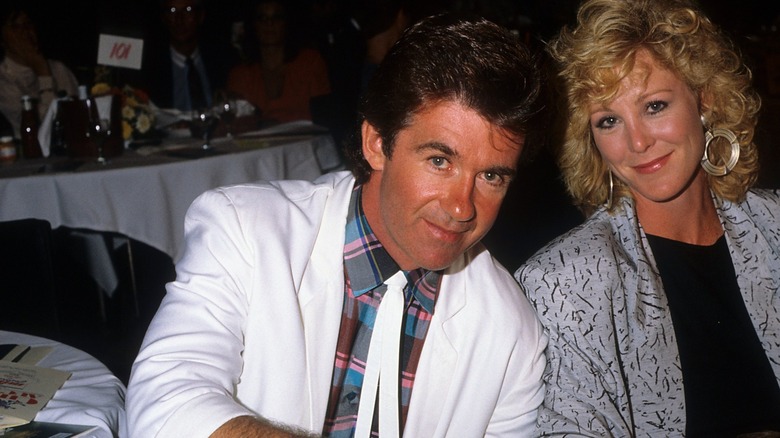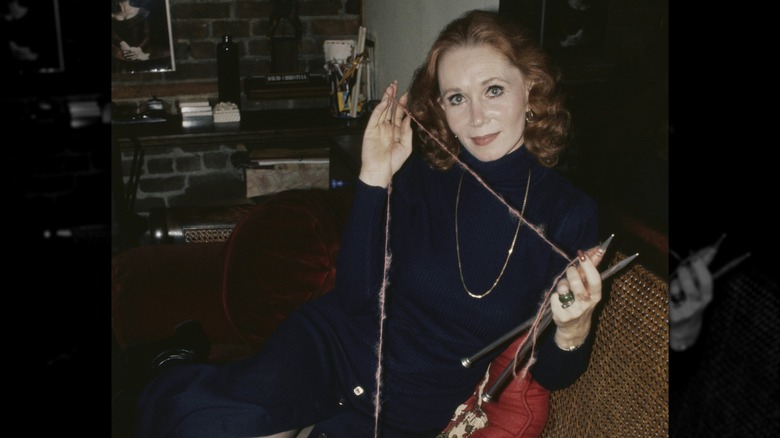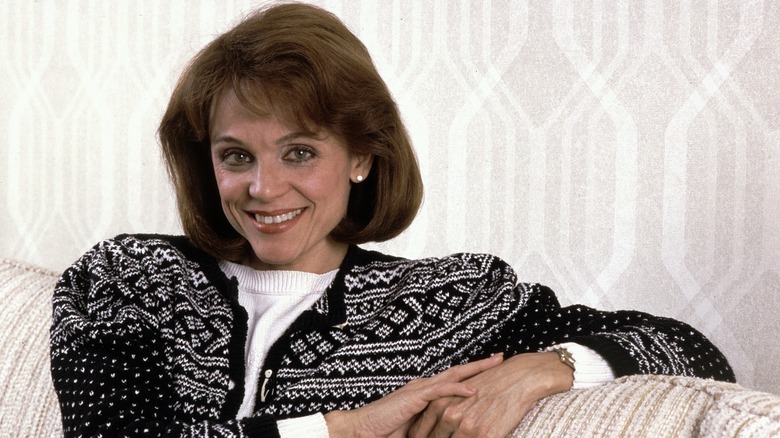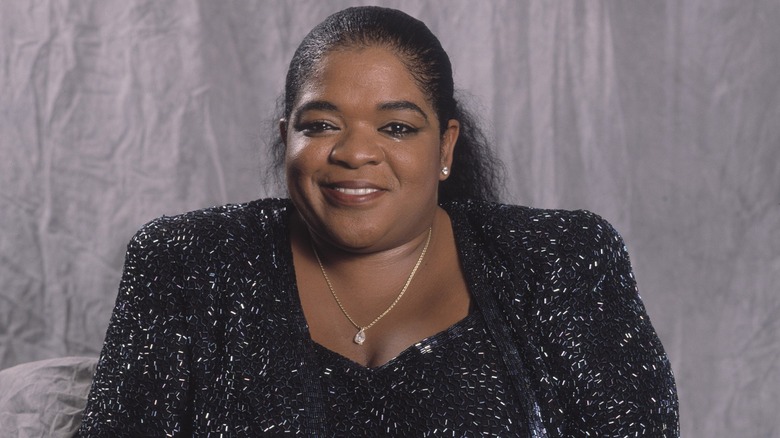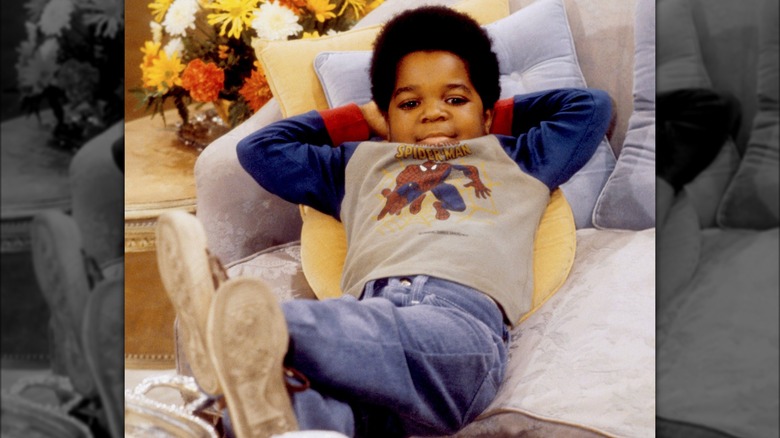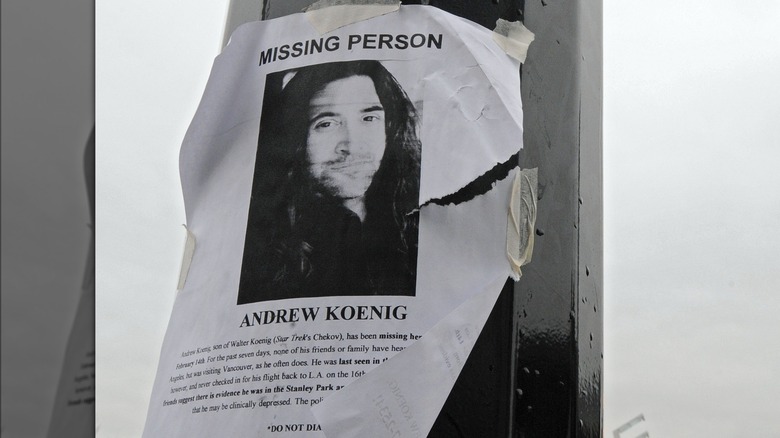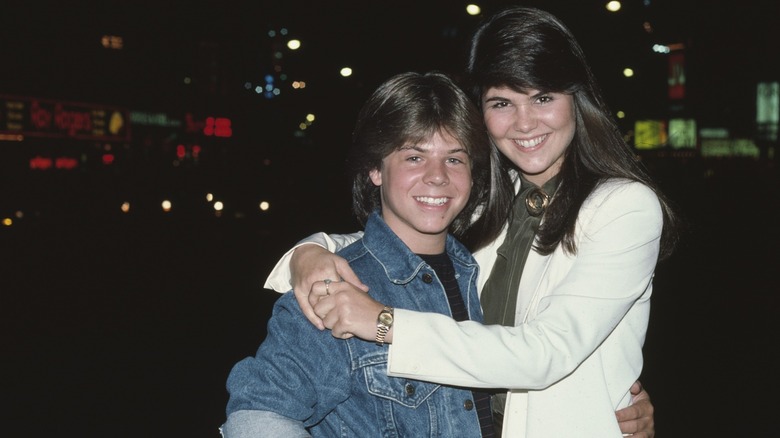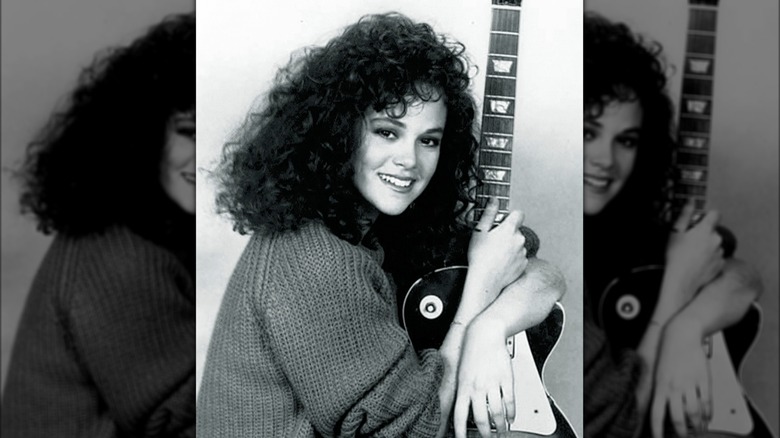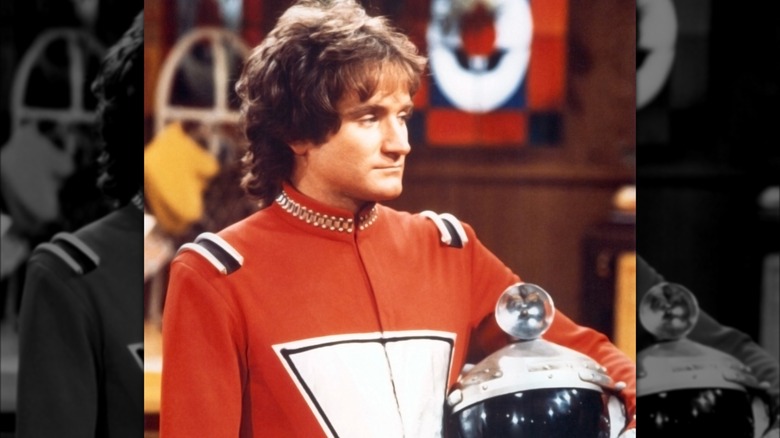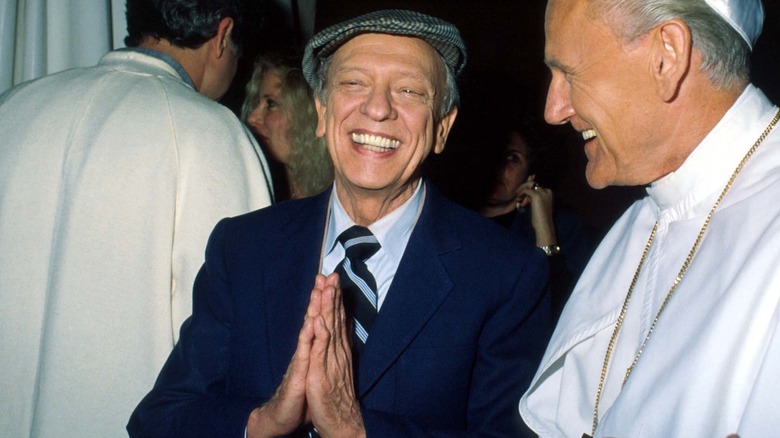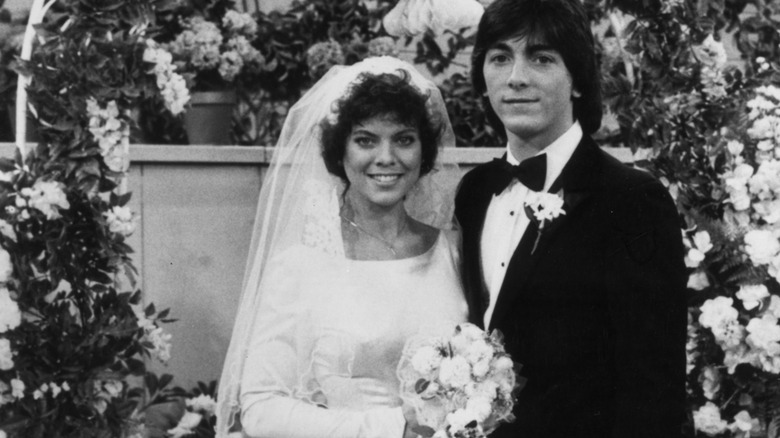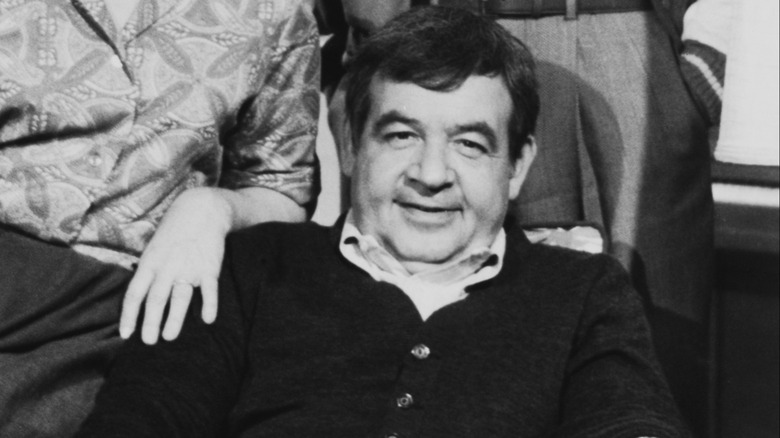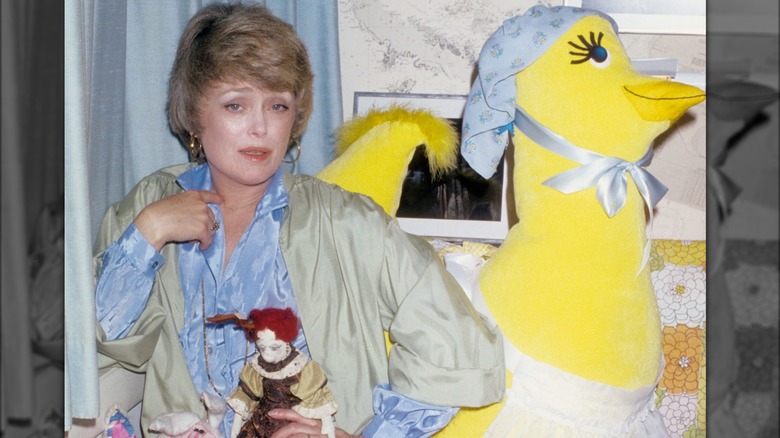'80s Sitcom Actors Who Died Tragically
Looking back, it's almost hard to believe how many iconic and legendary sitcoms came out in the 1980s. From "Growing Pains," to "The Cosby Show," to "The Wonder Years," there was definitely no shortage of family-friendly dramas that tugged at the heartstrings of millions of viewers every night. Even as the major motion picture industry was moving towards more action-based movies, like "Rambo" or basically anything that Arnold Schwarzenegger starred in, TV shows still largely remained the domain of the family. Many shows that got their start in the 1970s, like "Happy Days," "Diff'rent Strokes," and "Three's Company," also continued their runs into the 1980s, often to great success.
With many of the best shows' runs stretching for well over 100 episodes, viewers got to know and relate to their favorite characters almost as intimately as their own families. For some fans, Alan Thicke's role as Dr. Jason Roland Seaver imparted life lessons like a real father, and Adam Rich's portrayal of Nicholas Bradford was the best friend or brother that they always wanted. Sadly, that's probably why it's been so shocking and surprising to learn about many of their real-life deaths, especially those that were tragic. Over the years, here are some of the most tragic deaths of 1980s sitcom actors.
Alan Thicke
Without Alan Thicke, it's pretty safe to say that TV in the 1980s would be remembered much differently today. In addition to his portrayal of Dr. Jason Seaver on "Growing Pains" from 1985–1992, Thicke also produced some of the most iconic music from 1980s TV shows, too. Thicke helped compose the theme music for both "The Facts of Life" and "Diff'rent Strokes," two wildly successful shows that combined for nearly 400 episodes between them. On "Growing Pains," Thicke played Seaver as a psychiatrist and stay-at-home dad, who was beloved by millions for his warmth and compassion.
Thicke was a native of Ontario, Canada, and first got into acting in the late-1960s. While he was acting, Thicke also started a family, getting married twice and having three sons between them. Tragically, Thicke was playing ice hockey with his youngest when the unthinkable happened. In the middle of their warmups for a pickup game, Thicke went down on the ice after having a heart attack. He was taken away to the hospital on a stretcher, but he unfortunately passed away before they could save him.
While he was still at the rink he was apparently conscious and able to laugh and joke with his son, but for whatever reason his condition got worse and he was not able to make it. Thicke died on December 13, 2016, and he was still regularly acting at the time of his death at the age of 69.
Katherine Helmond
For nearly 200 episodes of "Who's the Boss" from 1984–1992, Katherine Helmond played the flirtatious Mona Robinson, the mother of main character Angela Robinson Bower. The sitcom was one of the most popular and successful of the decade, and Helmond's performance earned her two Primetime Emmy nominations as well as another Golden Globe nomination and a Golden Globe win. Besides "Who's the Boss," in the '80s Helmond also starred on "Soap," a sitcom that was meant to be a parody of soap operas, which began in 1977 and ended in 1981.
A native of Galveston, Texas and born in 1929, Helmond got married two times but did not have any children. On February 23, 2019, Helmond died due to complications from Alzheimer's disease. The news did not break until a week later on March 1, and she was 89 years old at the time of her death. Alzheimer's is a disease that leads to cognitive decline in patients by reducing their memory and thinking abilities, and it is a leading contributor to dementia, another cognitive disease.
Though her work had slowed down in the years leading up to her death, Helmond still continued to work as a voiceover artist. Most notably, Helmond voiced the character of Lizzie in the "Cars" franchise. Helmond's final role was that of Betty in the movie "Frank and Ava," which came out in late 2018 just before her death.
Valerie Harper
Fans of Valerie Harper undoubtedly remember her short-lived run on the sitcom "Valerie," which was initially created around her as the lead character. On the show, Harper played the role of Valerie Hogan, a mom raising three adolescent boys largely without their father. Harper initially got the role of Hogan in 1986 and played her for two years, but after season two she asked for a raise, which the network denied. Not only did the network fire Harper, but they also killed off her character and renamed the show (twice). Harper would eventually win a multi-million dollar lawsuit against the network, but never appeared on another episode of "Valerie" past season two.
Harper continued to act, both on TV and doing voiceover work, but in 2009 she was diagnosed with lung cancer, which eventually spread and turned into leptomeningeal carcinomatosis, a type of brain cancer. In 2013, she was told the cancer was terminal and was only given a few months to live, but a year later in 2014 she was still acting and the cancer was not spreading.
While she continued to act and do voiceover work, by July of 2019 her condition had deteriorated while going through chemo, and she set up a GoFundMe to help defray the medical expenses. Sadly, on August 30, 2019, Harper passed away due to complications from her cancer, at the age of 80 years old.
Mary Frann
Mary Frann was one of the top sitcom actresses of the 1980s, starring on the TV show "Newhart" for more than 180 episodes from 1982–1990. Prior to becoming a big-time sitcom draw, Frann spent most of the 1970s as a soap opera actress, appearing in just over 400 episodes of "Days of Our Lives" from 1974–1979. In "Newhart," Frann played the main role of Joanna Loudin, a sweater-clad realtor and the co-owner of a hotel with her husband Dick Loudin, who was played by the show's namesake Bob Newhart.
After "Newhart," Frann continued to act through the 1990s, mostly playing minor roles on TV. In addition to TV, she also hosted several parades and beauty pageants, including the annual Thanksgiving Day Parade in New York and the Miss Universe contest. Tragically, on September 23, 1998, Frann's companion found her dead in her home from heart failure. Frann was only 55 years old at the time and there had seemingly been no indication that she was unwell.
The night prior she had been volunteering at a homeless shelter in Los Angeles near her home in Beverly Hills, and she died in her sleep. Later, doctors found scarring on her heart muscle tissue, and the official cause of death was a heart attack.
Nell Carter
Nell Carter played the memorable role of Nell Harper on "Gimme a Break!" for seven years from 1981–1987, turning in an outstanding performance taking over as the matriarch of the Kanisky family following the death of matriarch Margaret Kanisky. Previously, Carter was already a notable TV actress, having played prominent roles on the soap opera "Ryan's Hope" and the comedy series "The Misadventures of Sheriff Lobo." She was also an award-winning Broadway star, and she won a Tony Award for her performance in "Ain't Misbehavin'!" in 1978. During her time as Harper, Carter was nominated for two Golden Globes and two Primetime Emmys, though she did not win.
Unfortunately, in the 1990s she dealt with multiple health problems. These included both a brain aneurysm as well as being diagnosed with diabetes. Carter would later die on January 23, 2003, likely from arteriosclerotic heart disease. The coroner did not conduct an autopsy, per Carter's wishes, but determined diabetes was a contributing factor in her death. From the late 1970s through the mid-1980s — coinciding with her time as Harper — Carter developed an addiction to cocaine, which may have also contributed to her heart problems (via The Washington Post).
Carter was still regularly acting at the time of her death, including recent stints on both "Reba" and "Ally McBeal." Her final credits were the movies "Swing" and "Back to Midnight," the latter of which was released posthumously in 2004.
Franklyn Seales
A native of the island of St. Vincent in the West Indies, Franklyn Seales had an incredible journey to becoming one of the top sitcom actors of the 1980s. Seales was born in 1952, and he moved to the United States in New York City in 1960 when he was still just a kid. He would later attend the prestigious Juilliard Academy after originally wanting to be an artist, and he graduated in the early 1970s. His big claim to fame in the '80s was his turn as Dexter Stuffins on the show "Silver Spoons," where he co-starred as a business manager for nearly 100 episodes.
In addition to his time on "Silver Spoons," Seales also had small performances on the sitcoms "Amen" from 1986–1987 and "Growing Pains" in 1987. Besides working in TV, Seales had several movie roles both before and after "Silver Spoons," and he likewise continued to act in theater, too. Seales was openly gay during his career, even when his work took him to hostile places like the Deep South, and he dealt with instances of homophobia while acting.
Sadly, on May 14, 1990, just a few years after "Silver Spoons" ended, Seales died at his home in Brooklyn, New York. Seales was only 37 years old at the time and his passing was due to complications from the HIV/AIDS virus. He had been too sick to regularly work for months, and he left behind six siblings and his mother.
John Ritter
One of the most prolific sitcom actors ever, John Ritter was a huge part of 1980s TV. From 1976-1984, Ritter played the role of Jack Tripper on "Three's Company," where he was a single man living with two female roommates, and the joke was he pretended to be gay so the building manager would let him live there. After "Three's Company" ended in 1984, Ritter reprised his role as Tripper on "Three's a Crowd," which centered around his love interest with Victoria "Vicky" Bradford, whom the creators had introduced in the waning episodes of "Three's Company."
After his run as Tripper ended in the 1980s, Ritter continued to act on various sitcoms, including "Hearts Afire" from 1992–1995 and "8 Simple Rules" from 2002–2003. Shockingly, it was while Ritter was on the set of "8 Simple Rules" on September 11, 2003 that he suffered an aortic dissection, which eventually proved fatal. An aortic dissection is when the inner layer of the aortic blood vessel tears, and it quickly turns deadly if not properly treated. According to a lawsuit filed by his widow, she alleged that the doctors misdiagnosed Ritter's condition as a heart attack, which led to improper treatment and thus his death.
Five years later in 2008, the doctors were found not liable for Ritter's death, arguing successfully that Ritter's condition was too far gone to treat. Ritter was only 54 years old when he died and is survived by his wife and four children.
Gary Coleman
Few catchphrases defined the '80s like "What you talkin' 'bout Willis?", which child actor Gary Coleman popularized while playing the character Arnold Jackson on the sitcom "Diff'rent Strokes." Coleman played the role of Arnold for more than 180 episodes over nine years from 1978–1986, during which he won four People's Choice Awards for Favorite Yong TV Performer as well as several Young Artist Awards for Best Young Actor and Best Young Comedian. "Diff'rent Strokes" was pretty unique as far as '80s sitcoms went. The premise was that Arnold and his brother Willis Jackson, two Black children from Harlem, were adopted by a single white father who raised them in the upscale part of town with his daughter.
When his run on "Diff'rent Strokes" ended, Coleman struggled to find consistent work as an actor, and he faced several arrests in the 1990s and 2000s. Coleman also dealt with congenital kidney disease since childhood, and multiple kidney transplants while he was growing up stunted his growth to less than 5 feet tall as an adult.
On May 28, 2010, while Coleman was at home with his ex-wife he suffered a severe fall and hit his head, leading to a brain hemorrhage. A few days later, Coleman died when his life support was terminated. Coleman was only 42 years old when died, and he had been hospitalized several times in the years before his death, though he was still reportedly active in the industry.
Andrew Koenig
On February 14, 2010, well after his stint on the classic '80s show "Growing Pains" had ended, actor Andrew Koenig was reported as missing by his family when he was not on a return flight from Vancouver to California. Just over a week later, after traveling to Canada, his father Walter Koenig found his son's body in a Vancouver park, and he was dead by suicide. Andrew was reportedly on medication for depression, though he may have stopped taking them leading up to his death. Reports also indicated that he had given away his possessions and had written an alarming note to his father recently, too. Andrew was only 41 when he died.
On "Growing Pains," Andrew played the role of Richard "Boner" Stabone for 25 episodes from 1985–1989, where he was a good friend of main character Mike Seaver. Andrew only appeared in the first four seasons, as his character was written out as having dropped out of college to join the United States Marine Corps in the episode "Semper Fidelis," which is one of the top-rated episodes of the show. After his time on "Growing Pains" ended, he only acted sporadically over the next few decades, though he did voice the animated series "G.I. Joe" for one season from 1990–1991.
If you or someone you know is struggling or in crisis, help is available. Call or text 988 or chat 988lifeline.org
Adam Rich
As the lovable and pint-sized Nicholas Bradford on "Eight is Enough," Adam Rich acted his way into the hearts of millions. The premise of the show was about a large family of eight who lived in Sacramento, California, and Nicholas was the youngest of the entire Bradford clan. Born in 1968, Rich had actually already been acting for a year by the time he was cast as Bradford, having appeared on "The Six Million Dollar Man" in 1976.
Rich was on "Eight is Enough" for over 100 episodes from 1977–1981, and he reprised the role for the 1987 and 1989 TV movies "Eight is Enough: A Family Reunion" and "An Eight is Enough Wedding." When the original series ended in 1981, Rich did not latch on to another successful sitcom, and he stepped away from acting for 10 years from 1993 to 2003 while dealing with legal problems. In April 1991, he was charged with burglary of a pharmacy and was also arrested for shoplifting, and the actor who played his father on "Eight is Enough," Dick Van Patten, bailed him out after his arrest. That October, he was arrested again for theft, and in 2002 he got a DUI.
The following year, on January 8, 2003, Rich was found dead from fentanyl poisoning. Rich had experienced substance abuse in the years before his death and had been in multiple rehabilitation centers and had previously overdosed several times. He was 54 years old when he passed.
If you or anyone you know needs help with addiction issues, help is available. Visit the Substance Abuse and Mental Health Services Administration website or contact SAMHSA's National Helpline at 1-800-662-HELP (4357).
Rebecca Schaeffer
Even years later, the death of Rebecca Schaeffer still stands out as one of the most tragic and heartbreaking in Hollywood history. Schaeffer was only 21 years old when her life was cut short by Robert John Bardo, an obsessed fan. Bardo shot Schaeffer to death after previously getting an autograph from her earlier in the day after tracking her down at her Los Angeles apartment. Bardo was able to get Schaeffer's information and address through a public records lookup from the California Department of Motor Vehicles, and Schaeffer may have been expecting someone else when she opened her door the second time for Bardo.
Eventually, Bardo was arrested and convicted of Schaeffer's murder and sentenced to life in prison. While serving his sentence, in 2007 a fellow inmate stabbed him 11 times, causing Bardo to be airlifted to a hospital, though he survived. There have been at least two TV shows/films inspired by Schaeffer's story, including "Moonlight Mile" in 2002 and the 1992 "Law and Order" episode "Star Struck."
In the 1980s, Schaeffer made her mark in sitcoms starring as main character Patti Russel on "My Sister Sam." She was on the show for 44 episodes from 1986–1988, and the show ended just prior to her murder. Her final credit was the movie "The End of Innocence," where she played a younger version of the main character Stephanie.
Robin Williams
Fans and critics undoubtedly remember Robin Williams for his iconic and amazing film career above all else, but he actually got his big break from sitcom acting in the 1970s and 1980s. From 1978–1982, Williams portrayed Mork on the show "Mork and Mindy," which was a spin-off from another popular sitcom "Happy Days." In the 1978 "Happy Days" episode "My Favorite Orkan," Mork first appears and tries to kidnap Richie Cunningham and take him back to his home planet, and the episode was so popular it spawned "Mork and Mindy" later that year.
Mork was an alien who lands on earth and starts a comical living arrangement with Mindy McConnell, a 21-year-old living in Colorado, and the two eventually get married with them hiding his true alien identity from the world. Following the end of Mork, Williams would go on to create one of the most successful acting careers in history, starring in classics like "Dead Poets Society," "Good Will Hunting," and "Good Morning Vietnam," among countless others, and numerous stand-up comedy specials.
Tragically, Williams died on August 11, 2014, by suicide at the age of 63. Doctors later discovered that Williams was experiencing a disease known as Lewy body dementia in the year before his death and he had also been diagnosed with Parkinson's disease. Lewy body dementia is a neurological disease that affects areas of the brain related to cognition and behavior, and Williams was reportedly experiencing memory problems before he died.
If you or someone you know is struggling or in crisis, help is available. Call or text 988 or chat 988lifeline.org
Paul Walker
Like Robin Williams, most people know Paul Walker from his extensive film career, which includes such mega titles as the "Fast and Furious" franchise, "Running Scared," and "Varsity Blues." Yet, Walker started his career in the 1980s on TV, and one of his first big roles was on the sitcom "Throb" from 1986–1987. Walker was only in the first season of "Throb" and played the role of Jeremy Beatty.
Nearly 30 years later, on November 30, 2013, Walker was leaving a charity event and riding in the passenger seat of a 2005 Porsche Carrera GT, a monstrously powerful sports car, when the driver Roger Rodas got into a horrific crash. Both occupants died at the scene, and fans of the actor quickly gathered and created a memorial. According to the initial autopsy report, Rodas lost control of the Porsche, spun out onto a curb, and struck two trees and a light post, before the car burst into flames. Walker survived the initial crash but died as a result of his injuries and from burning to death.
Walker was filming the movie "Furious 7" at the time of his death. The creators used digital effects to recreate his likeness for the final scene showing his beloved character Brian O'Connor driving, and the film was dedicated to him. Walker left behind a teenage daughter, who along with her father won millions in settlements from Porsche over the crash, and he was 40 years old when he died.
Don Knotts
Don Knotts was one of the most beloved actors of all time, largely coming to prominence in the 1960s on the sitcom "The Andy Griffith Show" as Deputy Sheriff Barney Fife. Sadly, Knotts died on February 24, 2006, at the age of 81. The cause of his death was pulmonary and respiratory complications from lung cancer. Andy Griffith, the namesake of the famous show, reportedly visited Knotts in the hospital just before he died, and he was also with family members.
In the 1980s, Knotts was on multiple sitcoms, including the immensely popular "Three's Company" and the short-lived "What a Country!" On "Three's Company," Knotts played the part of homophobic landlord Ralph Furley for more than 100 episodes from 1979–1984 during seasons 4-8. Ukranian-American comedian Yakov Smirnoff created the other sitcom "What a Country!," and it was a much more ephemeral show, only lasting a single season in 1987. Knotts entered the show halfway through the first season, playing the principal of a night school where students were studying for their citizenship tests.
Knotts continued to work all the way up until his death, mainly doing voiceover work in his later years. He did however also have a guest appearance on "That '70s Show" in 2005, where he parodied his role on "Three's Company" by playing a nosy landlord in the episode "Stone Cold Crazy."
Erin Moran
Revered actress Erin Moran passed away on April 22, 2017, from complications due to cancer. The star began to fall ill the previous November, and she eventually learned that she had skin cancer and started undergoing radiation and chemotherapy. The specific cancer that Moran had is known as squamous cell carcinoma (SCC), which is common as far as cancers go. The cancer progressed extremely quickly and by February she was practically incapacitated and bedridden. Moran died while holding the hand of her second husband Steve Fleischmann, and by that point, the Stage 4 cancer had spread to several parts of her body and was untreatable.
Immediately after she died, her former co-star on "Happy Days" Scott Baio made controversial comments where he referenced her using illicit substances earlier in her life as the cause of her death. Baio later clarified that he made the comments after seeing a report indicating she had died from a drug overdose and apologized.
A career actress, Moran was most fondly remembered for her stints as Joanie Cunningham on "Happy Days" from 1974–1984 and its fleeting spin-off "Joanie Loves Chachi" from 1982–1983, which was centered around her character's marriage to Chachi Arcola, played by Baio. As Cunningham, Moran was a main character on the show and the youngest of the Cunningham family, and Arthur "The Fonz" Fonzarelli would refer to her as "Shortcake." Moran appeared as Cunningham for more than 250 episodes total, and she was 56 when she died.
Norman Fell
By the time Norman Fell took on the role of Stanley Roper first on "Three's Company" and its subsequent spin-off "The Ropers," Fell was already a very established actor. Fell began acting in the 1950s after fighting in the Army Air Force during World War II, and some of his biggest credits prior to playing Roper were "Ocean's Eleven," "It's a Mad, Mad, Mad World," and "The Graduate." As Roper, Fell portrayed a crotchety old landlord who only let Jack Tripper (John Ritter) live in his building because he thought he was gay and thus not living unmarried with two women, which was a bit scandalous at the time.
After three seasons on "Three's Company," Fell and Audra Lindley who played his onscreen wife left the show for "The Ropers," a spin-off focusing directly on their lives after selling the apartment building and moving away. The show was short-lived and lasted less than 30 episodes before being canceled. After, Fell got a role on "Teacher's Only" for two seasons from 1982–1983, before it too was canceled.
On Thanksgiving in 1998, Fell was hospitalized after falling ill, and it turned out to be bone marrow cancer. Fell only survived for a few weeks after being diagnosed, dying on December 14, 1998, at the age of 74. His death was surprising to many, as he was not publicly known to be sick, and Fell was still active in the industry when he passed.
Tom Bosley
Tom Bosley played the role of Howard Cunningham, the patriarch of the Cunningham family, on "Happy Days" for a decade from 1974–1984. As Cunningham, Bosley became one of the most revered TV dads in history. Every week, fans watched him impart his wisdom on the Cunningham family and his son's friends, most notably Arthur "The Fonz" Fonzarelli, who often referred to Cunningham affectionately as Mr. C. On "Happy Days," Cunningham owned his own store, Cunningham's Hardware, and he was a caring and loving father and "Grand Poobah" of the local fraternal Leopard Lodge.
Bosley appeared in all 255 episodes of "Happy Days," as well as 2 episodes of its spin-off "Joanie Loves Chachi" revolving around his TV daughter Joanie Cunningham (Erin Moran). Bosley would later reprise the role in 2005 on the animated TV show "Family Guy" in the episode "The Father, the Son, and the Holy Fonz," briefly parodying his character.
On October 19, 2010, Bosley passed away from heart failure. Bosley had been diagnosed with lung cancer five months previously, and he was 83 years old at the time of his death. Bosley was undergoing treatment for the cancer through chemotherapy, but the disease was just too far advanced. Bosley left behind both a wife and a daughter and was a veteran of the United States Navy.
Rue McClanahan
In the 1980s, Rue McClanahan was one of the biggest matriarchal figures on TV, acting in several different sitcoms. In addition to her starring role as Blanche Devereaux on "The Golden Girls" for more than 175 episodes from 1985–1992, she was also on "Mama's Family" from 1983–1984 and "Charles in Charge" for a few episodes from 1984–1985. Other '80s sitcoms McClanahan briefly appeared on include "Small & Frye," "Newhart," and "Alice."
McClanahan was 76 years old when she died on June 3, 2010, from a brain hemorrhage caused by a stroke. Previously, McClanahan had dealt with breast cancer, and seven months prior, McClanahan had suffered an ischemic stroke from a blood clot, which is the most common type of stroke in the United States. This caused her doctors to put her on anticoagulants to stop the blood clotting, but she still had another stroke which proved to be fatal. Doctors cited McClanahan's advanced age of 60, her history of smoking, and possible anxiety, as reasons why the medication did not successfully prevent another clot and the subsequent stroke

